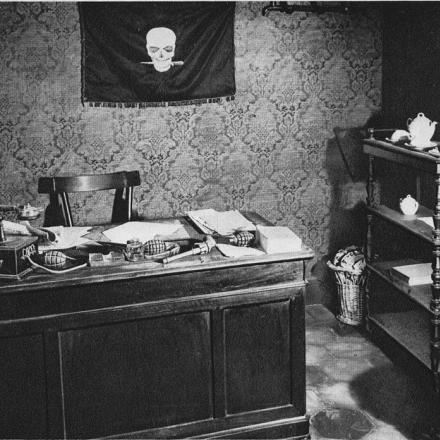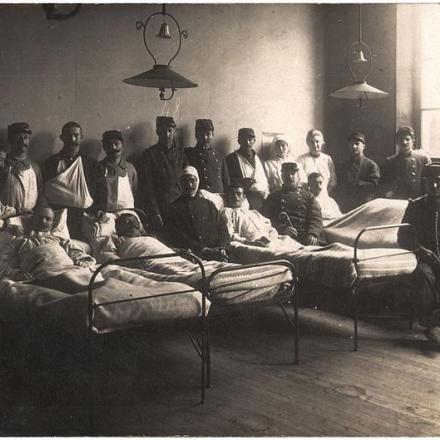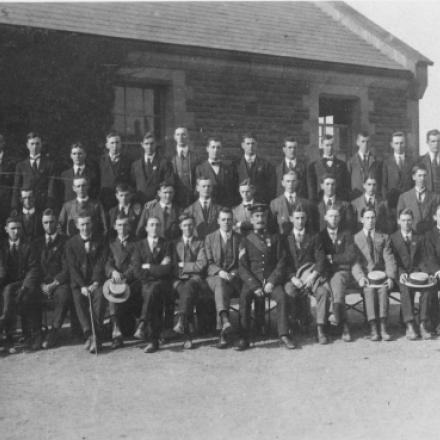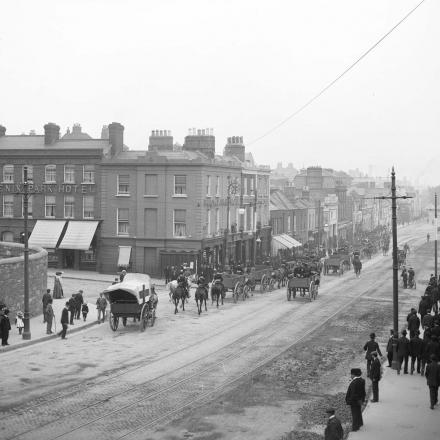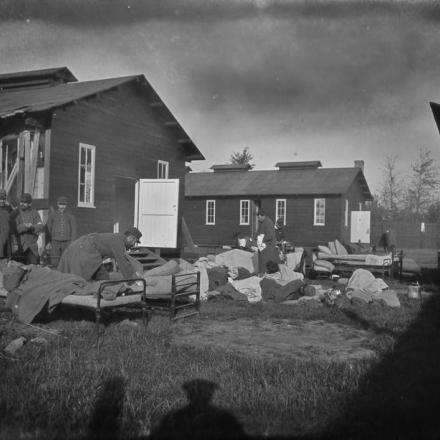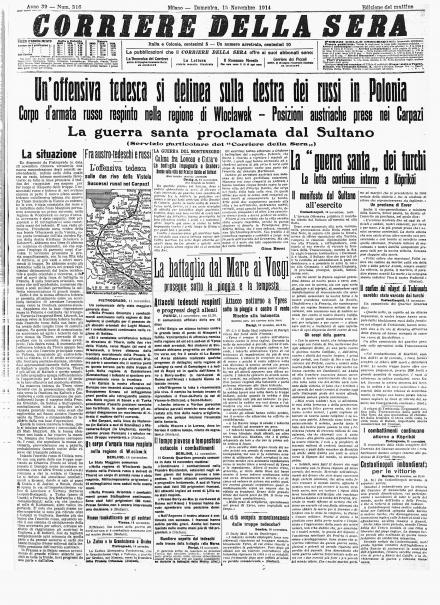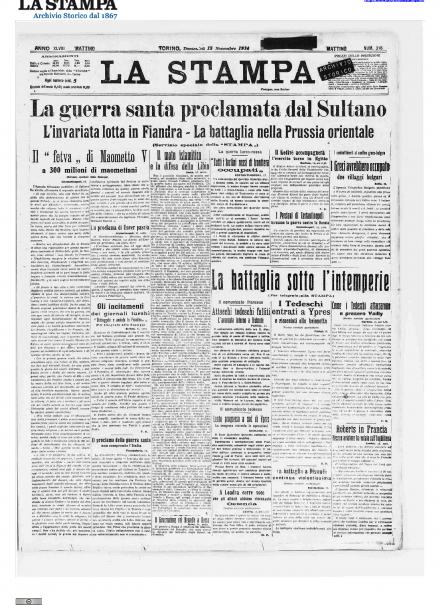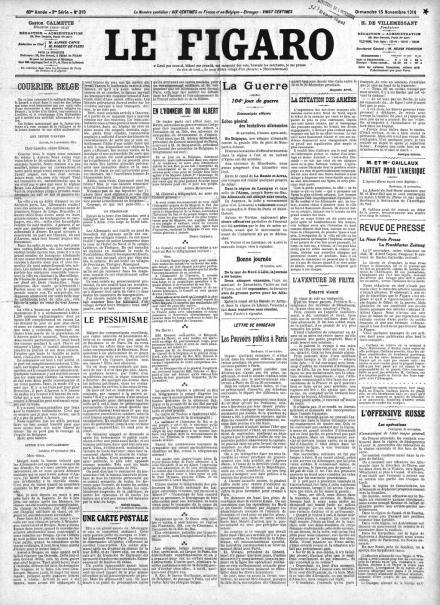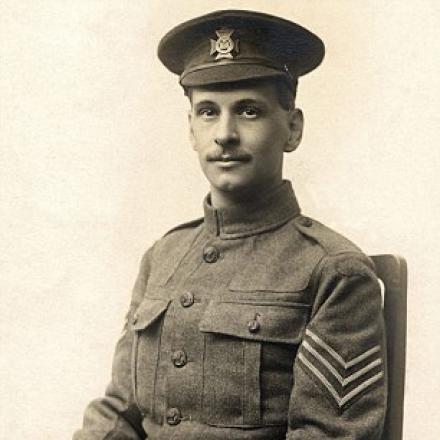Soffia il vento interventista
Il Governo italiano delibera lo stanziamento di 400 milioni per le nuove spese militari, una cifra di tutto rispetto. È un altro segnale lanciato dal mutevole e mutato vento politico.
La mattina del 15 novembre Milano si sveglia con un nuovo giornale: Benito Mussolini ha fondato il “Popolo d’Italia”. Tra il “parlare e il tacere” ha scelto la prima opzione. E quando mai ha taciuto?
Il suo primo editoriale si intitola «Audacia» e si scaglia contro il «dogma della neutralità assoluta». L’articolo si chiude così: «Il grido è una parola che io non avrei mai pronunciato in tempi normali e che innalzo invece forte oggi, a voce spiegata, senza infingimenti, con sicura fede, una parola paurosa e fascinatrice: guerra!»
Sta già cambiando idea sul perché entrare nel conflitto: dall’accorciarne durata e sofferenze per i popoli, al più banale nazionalismo.
Il neonato quotidiano trasuda interventismo; tra i finanziatori c’è persino il Governo francese, per ovvi motivi molto interessato alla questione.
E a proposito di francesi, a Ypres viene respinto l’ultimo serio assalto tedesco, la Guardia prussiana non ce l’ha fatta neanche questa volta.
Grandi novità sul fronte orientale: i russi si ritirano. Eh già, l’avanzata tedesca, partita da Torun, li costringe a ripiegare sulla linea Gąbin-Lodz; le armate zariste si attestano su posizioni difensive.
Diverso lo scenario più a sud. Ormai è iniziata sia la grande battaglia di Cracovia, sia la nuova invasione nel nord dell’Ungheria. Mancava un po’ di carne al fuoco.
Davide Sartori
GLI AVVENIMENTI
Politica e società
- Esce a Milano il primo numero de "Il Popolo d'Italia", il quotidiano fondato da Benito Mussolini.
- Il convegno regionale lombardo del partito radicale italiano vota unanime contro la neutralità dell'Italia.
Fronte occidentale
- Battaglia di Ypres: viene respinto l’ultimo serio attacco della Guardia prussiana.
- Vittoria degli eserciti Alleati nei dintorni di Ypres e Diksmuide.
- I tedeschi sono nuovamente respinti sulla destra del canale dell'Yser.
Fronte orientale
- Polonia: i russi si ritirano prima della forte avanzata tedesca da Thorn (Torun), conquistando la linea Gąbin-Lodz.
- Comincia la battaglia di Cracovia.
- I russi avanzano nuovamente verso i passi dei Carpazi. Comincia la seconda invasione russa del nord dell’Ungheria.
Fronte meridionale
- Serbia: gli austro-ungarici avanzano concentricamente su Valjevo. I serbi si ritirano nel sud-est.
Fronte asiatico ed egiziano
- Mesopotamia: schermaglie fra turchi e britannici a Sahain.
Parole d'epoca
Sergeant Bernard Joseph Brookes
Diario
Sunday, 15th November saw me at my duties at the small village Church, where the youngsters had an opportunity of shouting enough to seriously injure the lungs of an ordinary individual.
But at all the services I attended in France, the congregation, and especially the boys, seemed to make a point of shouting as preached to the accompaniment of the boom of the guns a couple of miles away, and on the whole it helped to make the service very impressive.
Every now and again one could feel the Church actually shaking when a big gun was fired. After the British troops had driven the Germs back through Erquinghem, a few Germs had remained in the Belfry of the Church with a supply of food, machine guns and rifles, and when a body of soldiers past, shots were fired.
At first it was not discovered from whence the firing proceeded.
The Germ artillery were also very smart in catching bodies of men who might be marching up the road. The hands of the clock having been seen to move rapidly, a search was made and these men were found in the tower, having used the hands for signalling in Semaphore, which accounted for the fact that the main body of the Germs knew so well when troops were moving, and through an aperture in the clock they had fired when men were passing.
I will not say what became of these men, but when I was there the clock face was shifted to one side, so preventing further tampering.
From six o'clock, for a period of about 30 minutes, a deafening cannonade was started by the guns, and we watched the flashes as they were fired, standing in awed groups, wondering when it would end.
